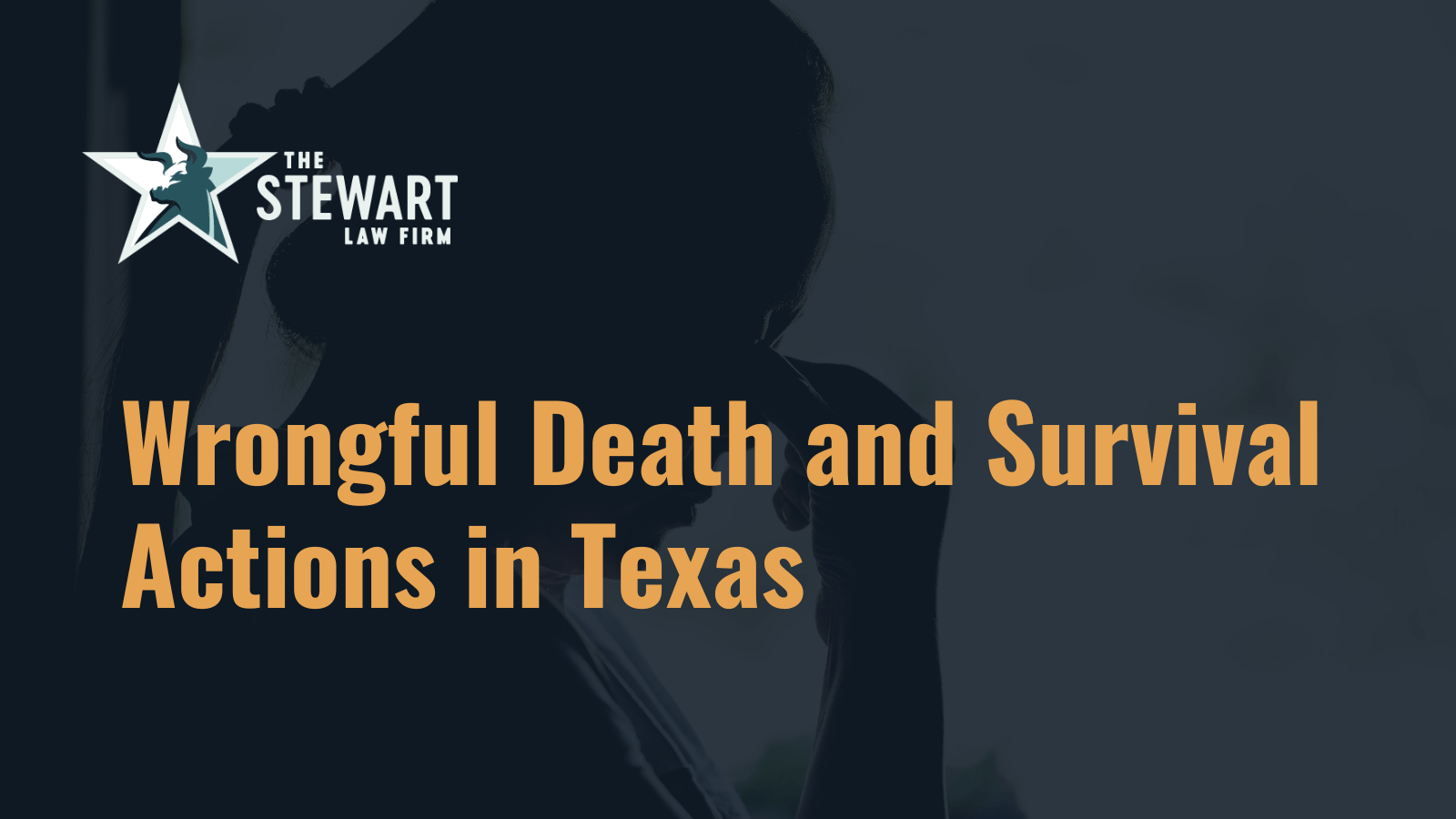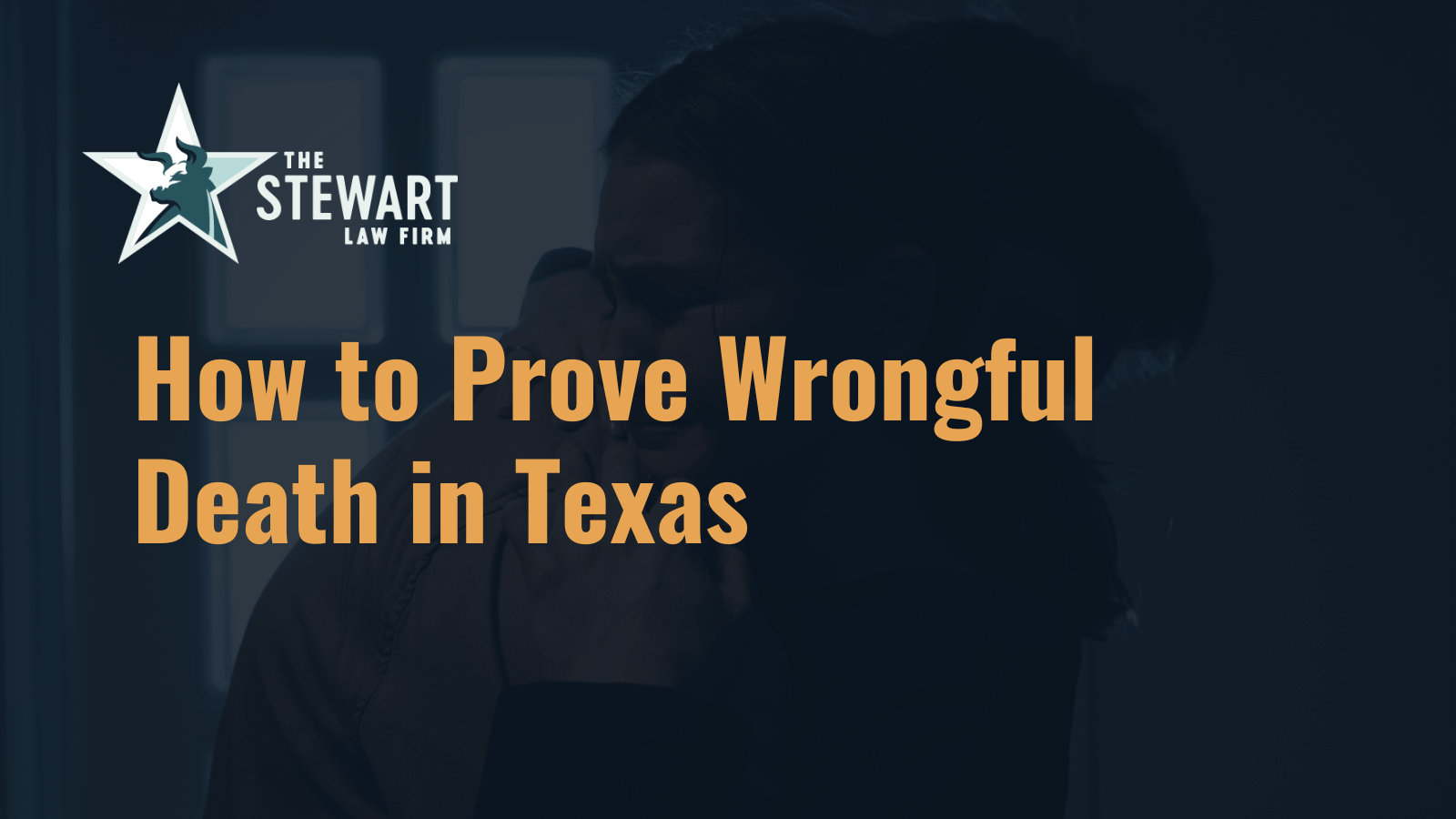Death is an extremely hard situation for anyone to go through, but when that death is linked to someone else’s negligence it can leave the family members and loved ones feeling completely lost and heartbroken.
The grief of losing a loved one in an unexpected event is something that leaves us with many questions and with very little answers. “Who is responsible for this? How do I seek justice? What can be done about this situation?” are all common questions someone may have after being involved in such a terrible life event.
Wrongful death as a whole isn’t talked about as much as it should be, which leaves those involved looking for answers. At The Stewart Law Firm in Austin, Texas, our personal injury attorneys work with people who have lost their loved ones to use these types of wrongful death cases to achieve justice for their losses.
Wrongful Death Suits in Texas
A wrongful death claim is a claim against a person who can be held liable for a fatality. Essentially, it’s a personal injury claim that was so tragic that it led to someone’s death.
According to Texas Statutes section 71.001, an action for wrongful death may be brought if:
“the wrongful act, neglect, unskillfulness, carelessness, or default” of one party causes the death of another party.”
Texas’ wrongful death statute allows certain relatives of a deceased family member whose death was caused by the acts of another person to pursue wrongful death actions.
These eligible parties include:
- Surviving husband or wife
- Children
- Parents of the deceased
1. Automobile Accidents
When it comes to wrongful death, the most common place to start the discussion would be on auto accidents, due to the number of people who drive each and every day. In a recent report addressing some of the cities with the worst drivers in the country, Austin sits at the top of the list for the state of Texas.
The National Highway Traffic Safety Administration released statistics on annual fatal auto accidents and found there to be over 34,000 fatalities in 2016, the most recent year they have statistics for. When you see this large number you can’t help but think, “how many of these deaths could have been prevented?”
The unfortunate truth is that the vast majority of these accidents were caused by at least one driver’s negligence, whether that’s through any of the following:
- speeding,
- drowsy driving,
- not paying attention to the road (also known as distracted driving),
- reckless driving, or
- choosing to drive while under the influence.
If any of these acts were committed leading up to the car accident, the negligent driver can be held liable for the deaths of anyone involved.
In the event that the accident was caused by road conditions, whether it is through unkept streets or weather conditions, the state may be held liable for the damages accrued.
2. Medical Malpractice
While we are hopeful thinking that doctors and nurses, due to being experts in their field, never make an error- the truth is that they are still human, and humans make mistakes. When mistakes are made in the medical field, those errors can end up costing a life.
In fact, in a recent study by the American Medical Association medical negligence is listed as the third leading cause of death in America, with only cancer and heart disease ahead of it.
The most common medical malpractice allegation is a failure to diagnose or misdiagnosis.
3. Defective Products
Some defective products may end up doing harm to an individual or causing some minor grievances, but what happens when a defective product ends with someone losing their life?
Companies are required to ensure that their products are safe for the public before releasing them on the shelves.
This is done through many different types of stress and safety tests. When a company fails to release a safe, consumer-ready product that leads to someone getting injured or killed, the company is at fault.
4. Workplace Accidents
If you’ve been in the workforce for some time now, it’s no surprise to you that getting injured at work is quite a common occurrence.
While jobs with higher risk, such as construction and manual labor, have a higher number of work-related fatalities, it’s possible in any occupation.
Wrongful deaths can occur in any of the following areas:
- the office,
- the worksite,
- the classroom, or
- even while not on the clock or at the job site.
Your workplace can be held responsible for wrongful death if they contributed to the employee being put in a dangerous situation. For example, if a police officer was working many 12 plus hour shifts of overtime, and then found themselves in a car wreck on their way home due to exhaustion, their employer may be held liable.
5. Nursing Home Abuse
Nursing homes are the homes to many of our nation’s most fragile citizens. Those in a nursing home were, in most cases, put there because they can no longer live a life solely relying on themselves. Residents of nursing homes are there because they require care and guidance for some of life’s most simple tasks.
When someone in a nursing home is abused, the results can be terrifying. When you take someone who is already in poor health and abuse them, the outcome can oftentimes be fatal.
Some of the most commonly seen forms of abuse found in nursing homes are:
-
Physical abuse
-
Malnourishment
-
Dehydration
-
Failure to monitor
-
Failure to diagnose
-
Negligence resulting in slip and fall accidents
If You’ve Lost a Loved One to Someone Else’s Negligence, Call a Texas Wrongful Death Lawyer For Help
Here at The Stewart Law Firm, we work around the clock to make sure you are taken care of the way you deserve. Our Austin, Texas personal injury attorneys believe that no one should have to pay the price for someone else’s negligence, especially when those mistakes and with someone losing a life.
Our firm offers free consultations to those in need. When you are in a time of need, the last thing that should be on your mind is finding the funds to seek the compensation you deserve.
If you have suffered from losing a loved one to what you believe to be someone else’s negligence, contact us to discuss your case.





